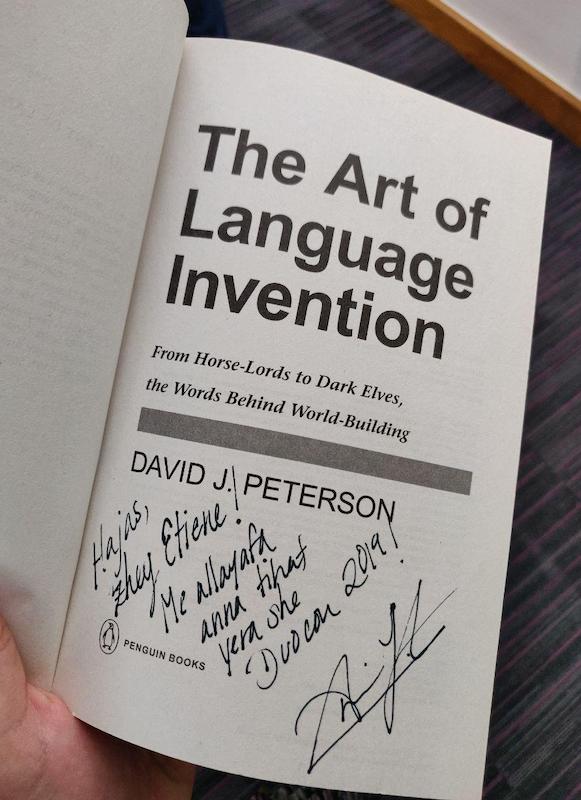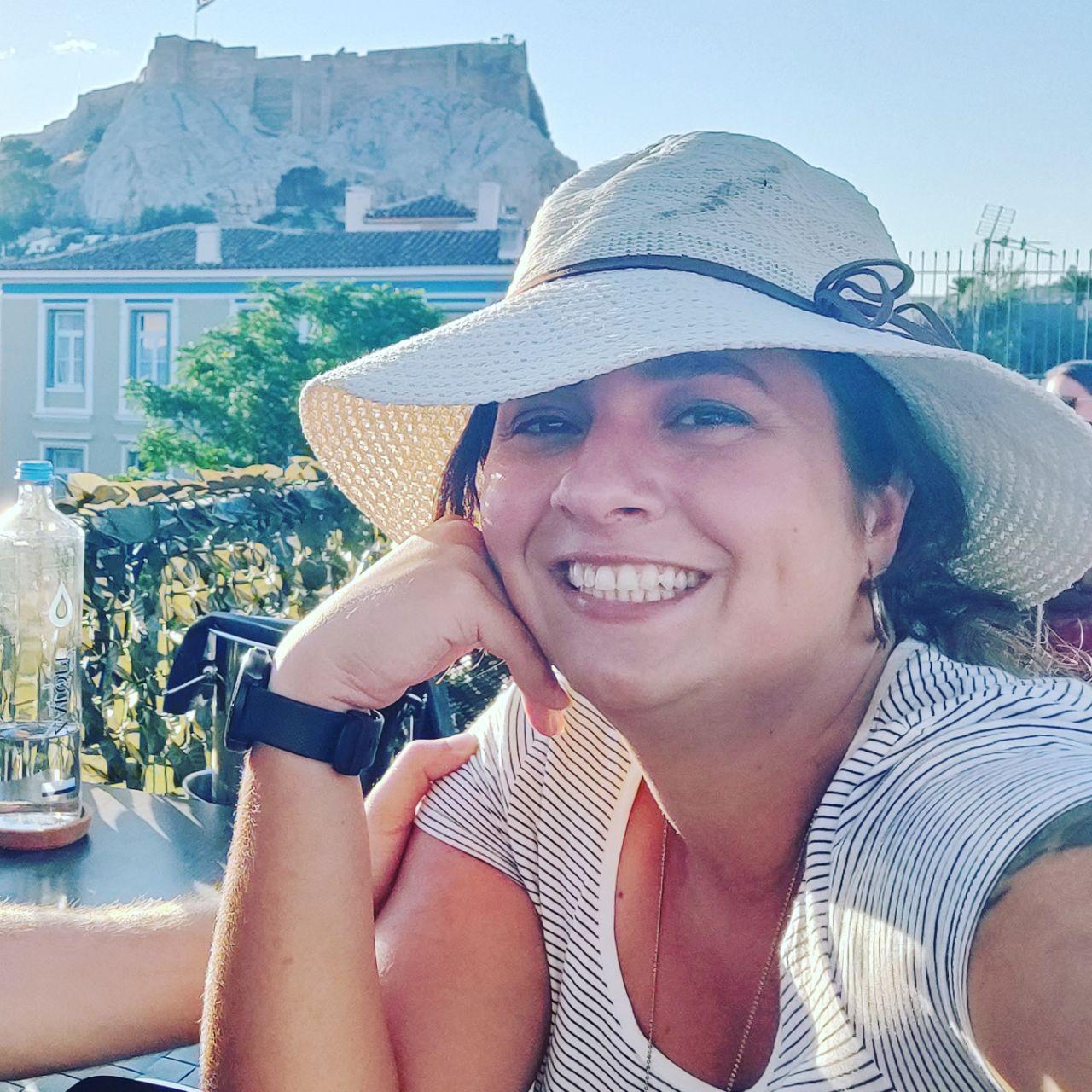This is the third of post of the series where I describe what I learned during Duocon and add some thoughts. In my last post I talked about learning a language efficiently and for free with Duolingo, and the talks from Luis von Ahn and Karin Tsai.
In this post I’ll talk about why I learn languages as I discuss the talk presented by David J. Peterson.
The usefulness of languages
David J. Peterson is the creator of the languages of Dothraki and High Valyrian for the TV show Game of Thrones. He also wrote the book The Art of Language Invention, which I bought recently (but haven’t read yet), but still promptly brought it to get it signed.

He is a great speaker and very witty. He started off by presenting various shitpostings from social media where people asked why would anyone learn a constructed language. I concede that it might be a bit frustrating for someone who is waiting a long time for a different language to be contemplated in Duolingo’s catalog. But yea, that’s a human labor bottleneck problem, not any conlang’s problem. I loved how David pushed forward that learning a language is fun in itself and how the question of efficiency is debatable, which is something I agree 100%. He went on to explore the single beauties of several languages, both the naturally developed and the constructed ones. At a later point during the conference he mentioned his favorite word is butterfly, which is something I remember quite distinctively because it’s one of my faves too, as it’s likely to be an interesting word in every language. I was heavily excited when I got to the part of Duolingo’s Greek course where I was finally introduced to Πεταλούδα. Yes, I am learning Greek, for no reason in particular. I started learning it for a vacation, then I liked it so much I kept working on it. It’s the most interesting language I’ve dealt with so far, granted I’ve not been exposed to that many. I just extract a lot of pleasure from learning it, and it’s something I can do to relax after an intense day.
Learning languages may sound to you like an intense brain activity and not very relaxing at all. But I guess when you do it for fun and without any particular expectation it does become more pleasurable and relaxing. You know what they say, work with what you love and you’ll never love anything again. As a Software Engineer, I understand my day-to-day process of language learning as having lots of memory operations, but very low CPU being required. While it does use my brain, once I have a plan and I know what to do, it’s quite mechanical and repetitive. It’s like having to think a lot but not having to think very hard. I never have to wrap my head around understanding very difficult problems, emotions, coming with solutions or elaborating new ideas. It’s not something I’d have to do for many continuous hours in the zone without interruption not to lose my flow to get 1 unit of result, which is what my day work looks like sometimes. It’s something I can do a little bit every day, at very very small incremental steps. All I have to do is try to absorb a few vocabulary words and 1 grammar rule at maximum and watch it slowly accumulate over time. It does not have a fast reward, but that’s ok when you’re not really looking for one. To me, it is clearly more intense than watching Nailed it on Netflix, but about as intense as watching something a bit more intricate like Dark with the additional bonus of learning a new skill. It is also way less intense than watching a documentary with very heavy political discussions that will make me sad or pissed off about how the world sucks and affect my mood and my body. I think language learning is very helpful for managing my mental health. It gives me the feeling that I’m not completely wasting my time and does not consume many spoons from me. Despite any arguments concerning what is optimal concerning methodology, one of my favorite things about many language learning apps, Duolingo included, is that they are low effort. I really like how I can just pick my phone anywhere and do a short lesson after a few taps. If I am too tired to do anything, it is very unlikely that I will be too tired for that.
One other thing that stood out from David’s presentation is a concept that is quite familiar to those of us who speak multiple languages: every language that we learn helps with the next one. Gradually we expand what we know to be possible in language constructs, sounds and form. The first time we see something too different is a bit of a shock but the next time, not really. This will present in very curious ways even in languages that are not necessarily related. For example, there are sounds that don’t exist in Portuguese (my native language), that I learned when studying French (my third) and that also exist when learning German (my fourth), so I use it for different languages but only had to learn that once. Der, die, das, the three gendered articles of German (masculine, feminine and neutral), can make very little sense to those who speak English and only have “the”, **especially as you get to words like das Madchen (the girl). But as a Portuguese speaker, I was already familiar with the concept. So when I started learning Greek and encountered o, η, το, οι, τα, I really wasn’t shocked at all. As I said, small incremental steps. Naturally, this same concept applies to constructed languages as well, which is something I never thought about before he pointed it out. It means that even from an utilitarian perspective, learning a con-lang has a lot of value at it gets you exposed to different concepts and sounds you aren’t familiar with in your native language.
I don’t I really don’t care if it’s useful to me or not but sometimes languages also turn out to be useful. Many years ago I started learning French for the most frivolous reason (it sounds sexy), then multiple years after that I had the opportunity to finish my Engineering degree in France. It basically changed my whole life. I don’t have a lot of hopes for Greek becoming useful. I just really like it. But who knows? I still don’t need to have a reason. Many languages with few speakers have multiple enthusiasts, including dead languages like Latin or Middle-Egyptian, and constructed languages like Esperanto. Interestingly, because David and Duolingo partnered to add a High Valyrian course to the app, they could also investigate what impact that would have in spreading the joy of language learning. According to him, indeed it seems that a significant amount of users whose first course was High Valyrian, probably just because they were a fan of Game of Thrones, later went on to start courses on other languages.
David also gave us some insight on what does constructing a language actually consists of. It’s a lot of work, to no surprise!For more details, he wrote a whole book on it, but in short: Not only you have to create the grammar rules, you have to create a lot of vocabulary, pronunciation and sometimes even different pronunciations as your language might have dialects. I was unaware of pretty much all the rest of his work and during his presentation he showed us many languages he created. They were all very interesting, but there was this one example, my absolute favorite, about a language that I think was created for a game that was just fantastic. The language was used by an alien population with no vocal chords and multiple tentacles, 7 of which they used to sign their sign language. I loved even more that the footage of the signing alien was rick rolling us in secret. Boy, am I jealous of his work. Really, when looking at that alien, I wished it was me up there. The creativity to explore the borders of languages beyond humanity is just… phenomenal.
This reminded of a fantastic book I’m currently reading (veeeeeery slowly as I’m reading it in German) called The Long Way to a Small Angry Planet, by Beck Chambers, where one of the characters has a set of multiple windpipes and vocal chords and therefore speaks a language that employs the use of harmonic intervals! And one of their struggles in learning the common language was coordinating all of their windpipes to produce unisons, single pitches at a time, like we humans do. Absolutely brilliant and delightful. I’m still at the beginning of the book and I’m already a huge fan. Apparently the series is very good for other exploration of social aspects too, so I hear, but I’m yet to get to those parts.
Inventing a language seems very CPU intensive, though? So to save my health I’ll give it a pass as a hobby for the time being. Still, it seems incredibly fun and such an interesting way to work on creativity that I’d love to give it a shot one day. I really to compile a list that gets me some more exposure of that goes out of the beaten track of classic examples like The Lord of the Rings and Star Trek. If you know of more novels, shows and games with interesting languages please leave some recommendations in the comments, I’d love to find out more.
There were some aspects about the usefulness of languages that I felt that David didn’t explore during his talk and I’d like to discuss here. Circling back a bit to the mental health aspects, engaging in brain activities is very important to me. Most of the women in my mom’s family developed early onset dementia for unknown reasons, so when I was a child I convinced myself that my only hope to escape that was to exercise my brain in the same way some people go to the gym. I could have picked something like crossword puzzles, I guess, but I went with languages purely for curiosity. I also learned how to play the piano for the same reasons. There is indeed lots of research suggesting that bilingualism helps delay dementia, so I’m glad that I sticked with this hobby. However, in situations where language is connected to various aspects of your whole identity the effects might be even sharper. This article on the incredible work of Professor Ghil’ad Zuckermann, explains in more details how reviving dead languages and giving indigenous peoples their languages back had amazing effects such as reducing suicide rates, alcoholism and even diabetes. I’m really not that much surprised. Language is one of the very distinct things about being human, it’s such a complex subject and it’s no wonder how vastly and deeply it can alter our paths through life.
In my next post I’ll talk about language revitalization and learning a minority language as I discuss the talk given by Noah Higgs on creating an Irish course at Duolingo.
